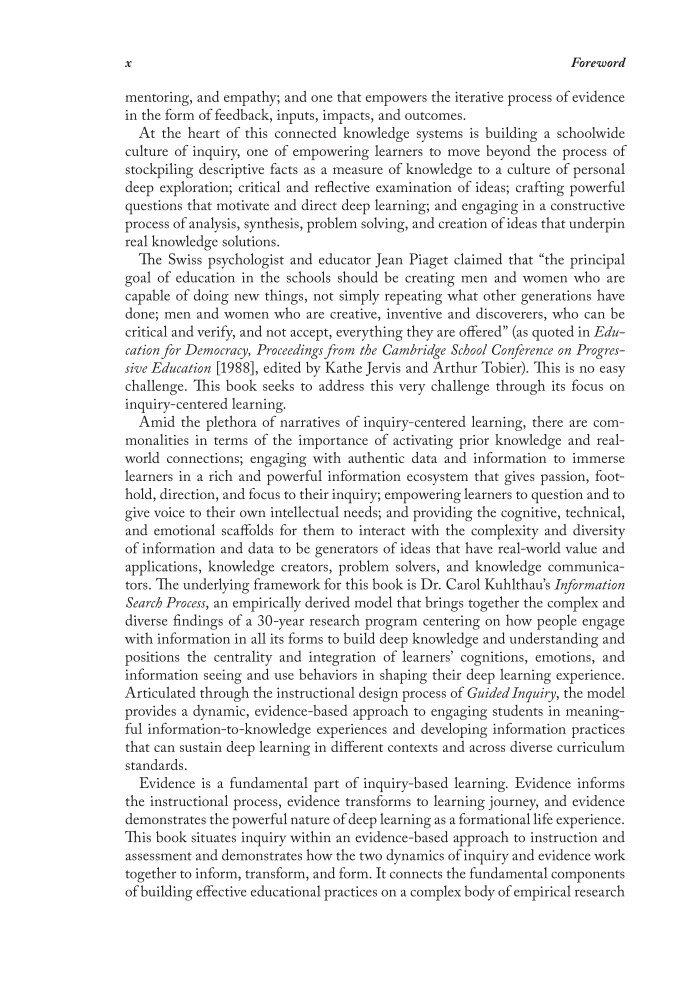x Foreword mentoring, and empathy and one that empowers the iterative process of evidence in the form of feedback, inputs, impacts, and outcomes. At the heart of this connected knowledge systems is building a schoolwide culture of inquiry, one of empowering learners to move beyond the process of stockpiling descriptive facts as a measure of knowledge to a culture of personal deep exploration critical and reflective examination of ideas crafting powerful questions that motivate and direct deep learning and engaging in a constructive process of analysis, synthesis, problem solving, and creation of ideas that underpin real knowledge solutions. The Swiss psychologist and educator Jean Piaget claimed that “the principal goal of education in the schools should be creating men and women who are capable of doing new things, not simply repeating what other generations have done men and women who are creative, inventive and discoverers, who can be critical and verify, and not accept, everything they are offered” (as quoted in Edu- cation for Democracy, Proceedings from the Cambridge School Conference on Progres- sive Education [1988], edited by Kathe Jervis and Arthur Tobier). This is no easy challenge. This book seeks to address this very challenge through its focus on inquiry-centered learning. Amid the plethora of narratives of inquiry-centered learning, there are com- monalities in terms of the importance of activating prior knowledge and real- world connections engaging with authentic data and information to immerse learners in a rich and powerful information ecosystem that gives passion, foot- hold, direction, and focus to their inquiry empowering learners to question and to give voice to their own intellectual needs and providing the cognitive, technical, and emotional scaffolds for them to interact with the complexity and diversity of information and data to be generators of ideas that have real-world value and applications, knowledge creators, problem solvers, and knowledge communica- tors. The underlying framework for this book is Dr. Carol Kuhlthau’s Information Search Process, an empirically derived model that brings together the complex and diverse findings of a 30-year research program centering on how people engage with information in all its forms to build deep knowledge and understanding and positions the centrality and integration of learners’ cognitions, emotions, and information seeing and use behaviors in shaping their deep learning experience. Articulated through the instructional design process of Guided Inquiry, the model provides a dynamic, evidence-based approach to engaging students in meaning- ful information-to-knowledge experiences and developing information practices that can sustain deep learning in different contexts and across diverse curriculum standards. Evidence is a fundamental part of inquiry-based learning. Evidence informs the instructional process, evidence transforms to learning journey, and evidence demonstrates the powerful nature of deep learning as a formational life experience. This book situates inquiry within an evidence-based approach to instruction and assessment and demonstrates how the two dynamics of inquiry and evidence work together to inform, transform, and form. It connects the fundamental components of building effective educational practices on a complex body of empirical research
Document Details My Account Print multiple pages
Print
You have printed 0 times in the last 24 hours.
Your print count will reset on at .
You may print 0 more time(s) before then.
You may print a maximum of 0 pages at a time.
























































































































































